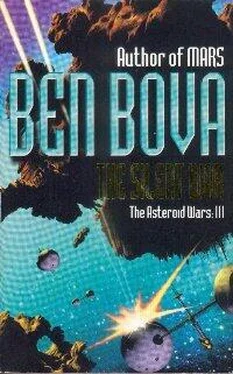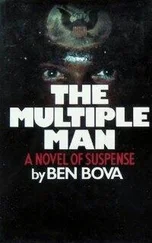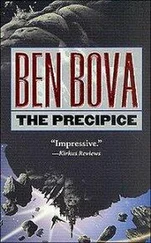“Only one corporation should manage the resources of the Belt,” Yamagata said firmly. “Competition is pointless, once nanoprocessing reduces the prices of asteroidal ores.”
“Not ores,” Humphries reminded him. “The nanomachines will produce pure metals.”
“And minerals,” Pancho added.
Humphries gave her an exaggerated bow of his head.
“But which corporation will gain the monopoly?” Yamagata asked.
“None of us,” said Pancho.
“What?” Humphries snapped. “It’s got to be one of us. Nobody else has the capability.”
“Selene does,” Pancho said, staring straight at Stavenger.
Looking back at her, he admitted, “I’ve been thinking that way, too.”
Humphries exploded, “If you think you’re going to muscle me out of what’s rightfully mine—”
Pancho waved him down. “Don’t pop your cork, Martin. I know how we can do this and keep our shareholders happy.”
“I don’t see how that can be done,” Humphries groused.
“Nor do I,” Nobuhiko added.
Grinning, Pancho clasped her hands together and leaned them on the conference table. “It’s simple. We each sign a contract with Selene for them to operate our asteroid business. We get the profits, minus a small percentage to Selene.”
“A manager’s fee,” said Stavenger.
“Right,” Pancho agreed. “Selene manages our operations and sets the market prices for the asteroidal products. The three of us just sit back and collect the profits.”
Yamagata took in a deep breath. Then, “I presume that Selene will set the prices as low as possible.”
“Very likely,” Stavenger said. “Those people on Earth need the resources. We won’t put power trips ahead of the people’s needs.”
“Power trips?” Humphries snarled. “You’ll have all the power.”
“That’s right,” Stavenger replied amiably. “Selene will be the arbiter for the rest of the solar system. No more competition. No more killing. No more war.”
“I don’t like it,” said Humphries.
Yamagata asked, “Can Selene be trusted with such power?”
“Can anyone else in this room?” Stavenger retorted.
A heavy silence fell across the conference table.
Finally Pancho said, “I’m willing to try it—on a five-year time limit. That way, if we’re not happy with Selene’s performance when the time’s up, we don’t have to renew the contract.”
“But only if two of the three corporations refuse to renew,” said Stavenger. “No single corporation can back out of the contract, it will take a majority vote.”
“Agreed,” said Pancho.
“I would like to consult my people back on Earth before agreeing,” Yamagata said.
“I still don’t like it,” Humphries grumbled.
“C’mon, Martin,” Pancho reached over and shook him slightly by the shoulder. “It’ll make life a lot easier for you. You’ll still be the richest sumbitch in the solar system. All you’ll have to do is sit back and pull in the profits. No more worries.”
“No more slaughters,” Stavenger said, his face still deadly serious. “Regardless of your intentions, Martin, it was your orders that led to the Chrysalis massacre.”
“That would never hold up in a court of law.”
“Don’t be too certain of that. War crimes courts can be very harsh.”
Humphries leaned back in his chair, his mouth a tight line, his eyes closed. At last he sat up straight and asked Stavenger, “Will you still exile me?”
Stavenger smiled. “No, I don’t think that would be necessary, Martin. You can rebuild your home down below. Besides, I rather think I’d like to have you close by, where I can keep an eye on you.”
The three-second lag in communications between Earth and the Moon did not irritate Nobuhiko Yamagata. He found it useful; it gave him a few moments to think before responding to his father.
Saito’s face grew solemn when Nobu told him of the tentative agreement they had hammered out.
“But this will keep Yamagata from moving back into space operations,” the older man complained.
“Not entirely,” Nobuhiko replied. “We will gain only a small share in the profits from asteroidal mining, true enough. But the price for asteroidal resources will become so low that we will be able to continue our rebuilding programs and invest in new space ventures, as well.”
“Lower our costs,” Saito muttered. “H’mm. I see.”
In the end, the elder Yamagata agreed that his son’s best course was to accept the agreement. By the time Nobuhiko ended his conversation with his father, Saito was already talking about building solar power satellites in orbit about the planet Mercury.
“The sunlight is much more intense that close to the Sun,” he said. “Perhaps I will leave this dreary monastery and lead the Mercury project myself.”
Soaked with well-earned perspiration, Martin Humphries held Tatiana Oparin’s naked body close to his own and contemplated his future.
“Maybe I won’t rebuild the house,” he said, gazing up at the darkened ceiling of the hotel bedroom. It sparkled with a thousand fluorescent flecks of light, like stars on a summery evening back on Earth.
“Not rebuild it?” Tatiana murmured drowsily.
“I could go back to Connecticut. That’s where my boys are living. The runt’s nothing much, but Alex is turning into a real son. Just like his father.” He laughed at his private joke.
“You’d leave the Moon?”
“Just for a visit. To see the kids. And there’s other family still down there. Can’t take too much of them.”
“But you’ll still live here at Selene, won’t you?”
“Maybe. Maybe not. Hell Crater’s an interesting place. Maybe I’ll buy into one of the casinos there. Be a playboy instead of a captain of industry. Might make a nice change for me.”
“You would make an excellent playboy,” said Tatiana, snuggling closer to him.
Humphries laughed in the darkness. This is a lot easier than running a corporation, he thought. Let the others do the work. I’ll spend the profits.
Stavenger spent much of his evening sending a long, detailed report to his wife about the peace conference.
“I think it could work,” he concluded. “I think we can make it work.”
Edith was on her way back to him, he knew. She had survived the atrocity at Ceres unscathed, physically. Her news coverage, complete with computer-graphic simulations of the actual attack based on her eyewitness description, had been the biggest news event since the greenhouse floods had first struck. There was already talk of a Pulitzer for her.
None of that mattered to Stavenger. Edith’s all right, he thought. She’s on her way back. She wasn’t hurt. It was an emotional trauma for her, but she wasn’t physically harmed. She’ll be all right. I’ll help her recover.
Edith’s news reporting had been the key to making the peace agreement, Stavenger realized. With the Chrysalis massacre in full view of every person in the solar system, Humphries and the others had no choice except to come to some sort of an agreement to end the fighting.
Now comes the hard part, Stavenger told himself. Now we have to make the agreement work.
Pancho was packing her travel bag when the call from Jake Wanamaker came through. She invited him to come to her residence.
By the time he buzzed at the front door, Pancho was packed and ready to go. She carried her travel bag to the door and let it drop to the floor, then opened the door to let Wanamaker in. In the languid lunar gravity, the bag thumped on the carpeting as Wanamaker stepped into the entryway.
“Going somewhere?” he asked.
“Yep,” said Pancho, ushering him into the sitting room. “But I got lots of time. Want a drink?”
Читать дальше












